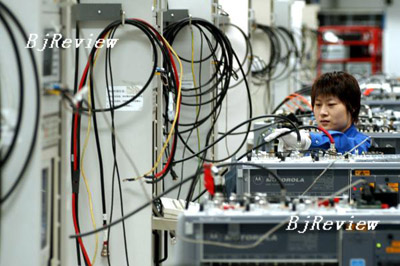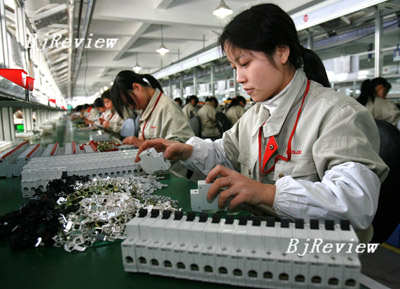
China isn't exactly planning to adopt an across-the-country flat tax on all enterprises. But judging by a new corporate income tax law, a standard tax rate could be more widespread than before, while enterprises of key sectors supported by the government will continue to enjoy preferential policies.
Let's go back in time a bit.
After China adopted its reform and opening-up policy in the early 1980s, the government offered favorable income tax rates to attract foreign investment and boost the Chinese economy. Yang Yiqing, taxation professor with the Central University of Finance and Economics, pointed out that on the surface, the income tax rate of both Chinese and foreign-funded enterprises is the same at 33 percent. But in some special regions, a more favorable income tax of 24 percent or even 15 percent has been granted to foreign-funded enterprises. However, the majority of domestic companies are still taxed at 33 percent and only the least profitable ones can be entitled to a favorable tax rate of 18 to 27 percent.
Generally speaking, the actual tax burden on Chinese enterprises is twice that of foreign-funded companies.
With the development of a market economy, especially now that the transitional period of China's entry into the World Trade Organization has ended, it would be quite unfair to apply different income tax rates to Chinese and foreign-funded enterprises. Moreover, it would be harmful to the establishment of a unified, regulated and fair competitive market.
"The loopholes in the current corporate income tax rate lead to distorted enterprise operation and give rise to a loss in state tax revenue," said Yang. "Additionally, many important taxation policies were issued by relevant departments with limited legal effects. Therefore, it is paramount to make those policies into laws."
As a matter of fact, those voices calling for a unified and fair taxation policy have gained strength in the past few years. Since the Second Session of the 10th National People's Congress (NPC), altogether 541 NPC deputies have offered 16 motions to enact an enterprise income tax law in an effort to unify the income tax of both Chinese and foreign-funded enterprises.
On December 29 last year, the 25th meeting of the 10th NPC Standing Committee was closed in Beijing, with almost all the attendees agreeing to submit the draft income tax law to the deliberation of the Fifth Session of the 10th NPC in March this year.
Minister of Finance Jin Renqing pointed out that it is time to reform the enterprise income tax system to quickly unify the income tax on both domestic and foreign-funded enterprises.
"This round of tax reform is aimed at improving the quality and level of utilizing foreign capital," Jin said. "A favorable income tax policy will be granted to new and hi-tech enterprises, which will help upgrade and optimize the foreign investment structure."
It's 25 percent
The most critical issue related to the income tax act is the new tax rate. According to the draft law, the enterprise income tax rate for both domestic and foreign-funded enterprises would be set at 25 percent. Meanwhile, in line with common international practice, in order to support the development of small enterprises and enlarge employment, a favorable enterprise income tax rate of 20 percent would be granted to small and less profitable businesses. The State Council is still working to define what are considered to be small and less profitable enterprises.
Why is 25 percent so significant?

Minister Jin said the chief concern was to relieve the tax burden on domestic enterprises, while making sure that foreign-funded enterprises would not be overly burdened by the tax. Meanwhile, the revenue deduction must also be sustainable for the government. The tax level of neighboring countries and regions has also been considered.
According to statistics from the Ministry of Finance, the average enterprise income tax rate of 159 countries is 28.64 percent. Jin stated that the 25 percent rate is relatively low in the world and will be conducive to maintaining China's tax competitiveness and attracting more foreign investment.
All in all, the income tax rate for domestic enterprises would be reduced by 8 percentage points from the original 33 percent. As a result, the state tax revenue would come down accordingly. Yang estimated that if the new tax rate takes effect in 2008, the annual tax revenue from domestic enterprises would drop by 134 billion yuan, while that from foreign-funded enterprises would increase by 41 billion. It means a total of 93 billion yuan would be deducted from the previous annual tax revenue.
"Currently, China's economy is developing at a rapid speed and the overall profitability of enterprises has been raised considerably in recent years," Jin pointed out. "The state revenue is increasing steadily. Under such circumstances, the state's finance can sustain the possible setbacks brought about by the income tax reform. That's why it is good timing to reform the system."
Industry-oriented
In the future, the income tax will be differentiated mainly according to the nature of the enterprises, or the industry each enterprise belongs to. Previously, a more favorable income tax rate was granted to those investing in less developed regions.
In the past, in order to bridge the gap between China's eastern and western parts and boost the development of the western region, some foreign-funded enterprises were taxed at a 15 percent rate for a period of 10 years. Those exporting 70 percent of their products were taxed at only 10 percent. Additionally, a considerable proportion of imported technological equipment was exempt from import tariffs and import value-added tax.
Jin stated that the draft law would chiefly apply favorable tax rates to key industries supported by the government. Meanwhile, a favorable income tax rate would still be granted to industries encouraged by the state in the western region.
To review:
-- Hi-tech enterprises strongly supported by the government would be taxed at 15 percent. A favorable tax rate would be granted to enterprises engaged in industrial investment and those that are devoted to environmental protection, energy and resource conservation, and safe production.
-- Enterprises making investment in agriculture, forestry, animal husbandry, fishery and infrastructure construction would maintain their favorable income tax rates.
-- Direct tax reduction and exemption on labor service, welfare-oriented and resource utilization enterprises would be substituted with preferential tax policies.
-- Production-oriented foreign-funded enterprises would no longer enjoy regular tax reduction and exemption. Export-oriented foreign-funded enterprises would no longer enjoy a 50 percent reduction in income tax rates.
Yang believes that this round of tax adjustment actually favors enterprises that are devoted to resource and energy conservation, environmental protection and hi-tech development.
Not a big deal
Will the tax unification hurt the competitiveness of foreign-funded businesses? Will the new law kill their investment enthusiasm?
Jin doesn't think so.
He admitted that while the tax burden of different enterprises will differ, the overall tax burden will go up. But the new rate won't hurt their profitability.
"This round of tax readjustment is more beneficial to foreign-funded enterprises," said Yang. "As for those who had enjoyed a tax rate lower than 25 percent, the tax burden is raised a little bit. However, as many of the foreign-invested enterprises in China are in hi-tech industries supported by the government, they can also enjoy the 15 percent income tax rate. Meanwhile, according to the new tax law, the 15 percent favorable tax rate can be applied to all hi-tech enterprises in all areas of the country. Therefore, the income tax rate readjustment won't pose a heavy burden for the majority of foreign-invested enterprises."
Liu Longheng, a taxation professor with Peking University, noted that from a long- term point of view, the object of this draft law is to establish a standard, transparent and fair tax collection environment, which is more conducive to attracting foreign investment in China. According to World Bank research, China's stable political situation, sound economic development, vast market, rich labor resources, enhanced commercial infrastructure and government services are the most important factors that attract foreign investment. Liu contended that a favorable tax rate is a less important factor considered by foreign investors. Transparent tax policies and non-discriminative policies are more important, Liu said.
Five-year transition
After the adoption of the new tax law, how to deal with the loss caused by favorable tax rates is a sensitive question for affected businesses.
In order to ease the possible tax burden, the draft law stipulates that a transitional period would be granted to enterprises set up before the law takes effect.
Enterprises currently entitled to low income tax rates at 15 percent and 24 percent would enjoy a five-year transitional period after the new tax law takes effect, for instance.
"In order to attract foreign investment, a transitional period is necessary," said Zhang Baoyun, a taxation partner with Delloitte & Touche. "But for how the new income tax law will perform, we look forward to specific rules for its implementation," Zhang added.
| 